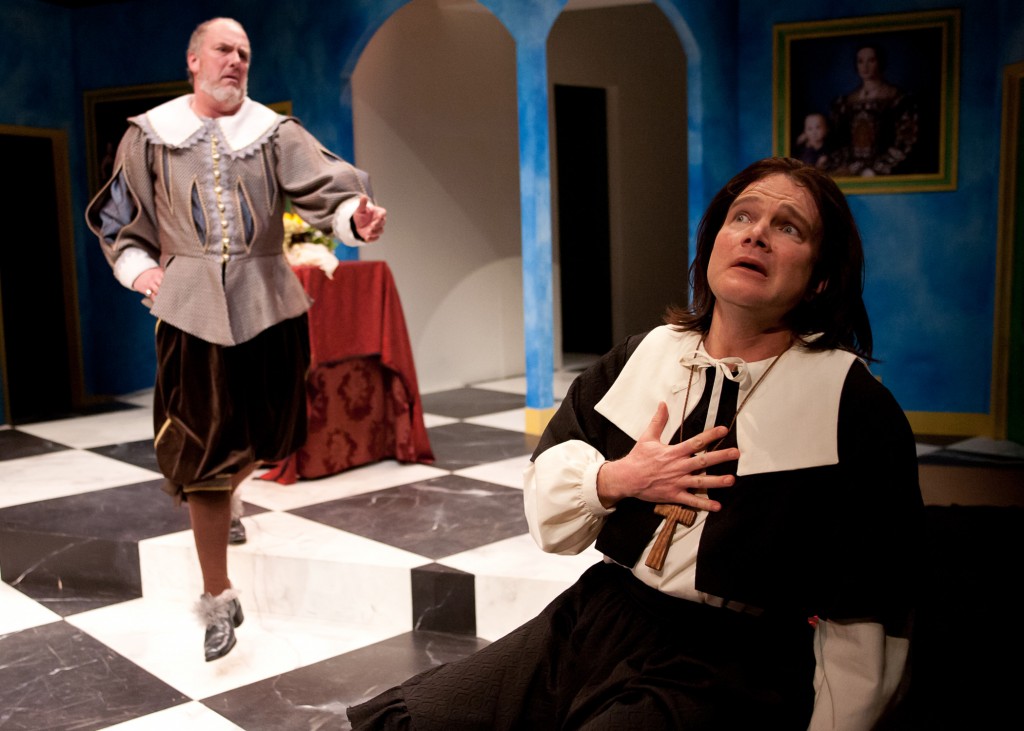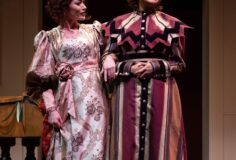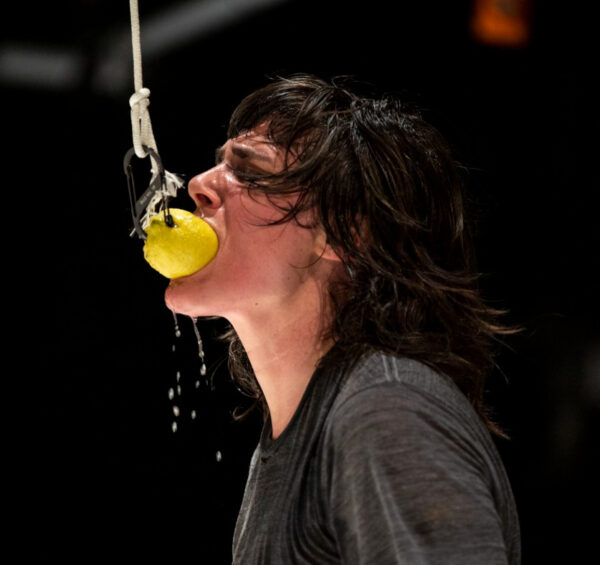
Don Brady as Orgon and Frank Lawler as Tartuffe in Taproot's production of Molière's Tartuffe. Photo by Matthew Lawrence.
Review: Tartuffe by Molière. Directed by Karen Lund. With Ruth McRee, Charity Parenzini, Jesse Notehelfer, Solomon Davis, Don Brady and Frank Lawler as Tartuffe. At Taproot through March 3, 2012.
Busty maids…foolish old men…foppish youth…roguish con men; yes, it’s time for another local production of a play by the master French playwright, Molière and up this time is his classic satire “Tartuffe” currently being staged at Taproot. The plot is simple: an apparently religious man, named Tartuffe, down on his luck, finagles his way into the home of Orgon, the foolish head of a society household. The other members of the family and staff quickly see that Tartuffe is an impostor but Orgon stubbornly refuses to listen and eventually Tartuffe gains control of their lives. Only a last minute reprieve from the King can restore things to the way they were. “Tartuffe” might just be Molière’s tartest and most cynical work, as it examines the hypocrisy of upper class French society and the religious establishment in charge of all things moral and political. Briefly suppressed by the government of King Louis XIV (who personally enjoyed Molière’s work) at the instigation of the Archbishop of Paris, “Tartuffe” was a scandal in its day and age. And, it’s timeless themes can still resonate today; hypocrisy among certain elements of conservative society still reign loud and clear in the 21st Century.
Unfortunately, the bite has been dulled in Taproot’s production. The naughtier elements of the farce have been well covered up, (Sarah Burch Gordon’s costumes are pretty, but the décolletage on display is chaste and demure), and the roguish charlatan Tartuffe himself, is clearly the only villain on display. The hypocrisies of Orgon and his family and good Christian society in general are rather left off the hook. What we have left, is a production that veers into an oddly chaste Benny Hill sketch without the boobs or fart jokes. Taproot’s “Tartuffe” is loud and frenetic but it’s not very sexy and most of the cynicism and satire have been white-washed. It ends up being a mildly enjoyable comedy trifle but nothing more.
It also got off to a rocky start. The first half of the first act was strangely rushed and garbled, yet dull. The actor’s didn’t seem very comfortable with Molière’s rhyming couplets either…the effect was sing-songy/Dr. Seuss-y rather than classical. It doesn’t help that Taproot is using noted poet Richard Wilbur’s rather tame translation…it’s widely produced but a bit old fashioned and toothless compared to more recent translations.
Things picked up as the play progressed with Act One ending on a high note and Act Two being largely more polished than the first. The performances were largely fine with nice work from Jesse Notehelfer as Orgon’s practical wife Elmire; Charity Parenzini as the scheming maid Dorine and Solomon Davis as the impetuous son Damis.
But, Don Brady was poorly cast as Orgon, the very foolish, stubborn head of the household under attack from Tartuffe. Mr. Brady is a big, hearty, handsome and virile man while Orgon is typically portrayed as elderly, wizened and impotent. Casting against type can lead to some interesting and compelling productions, but the problem with Mr. Brady’s casting is that his Orgon comes off as a bit menacing, especially when he’s threatening to beat his servants. It’s supposed to be funny when Orgon vows to slap Dorine for her impertinence but here it just comes off as creepy. And, the heartiness and power of Mr. Brady make it seem unlikely that he would be so easily defeated by Tartuffe. The actor does a fine enough job with the role, but he’s just the wrong type physically or emotionally to make a convincing patsy.
As for Tartuffe himself, veteran Seattle actor Frank Lawler makes a convincing scoundrel and rogue but he’s actually a bit more comedic than necessary. It doesn’t help that facially, Mr. Lawler slightly resembles Benny Hill, with an impish face and a twinkling eye. His Tartuffe isn’t very layered and it’s quite apparent that the character is a charlatan from the get go…there’s nothing very ambiguous about this portrayal. He’s funny and crowd-pleasing, but not very true to the text or meaning of the play.
Taproot’s “Tartuffe” has its moments…after a VERY slow start, it does lead to some entertaining comedy hi-jinks but that’s not what this play is supposed to be about. Molière’s intent seems to have been lost among the pretty candy colored costumes, cartoon cardboard set and broadly drawn performances. It’s fluffy and forgettable and toothless.

















